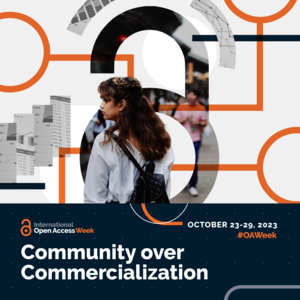For our Open Access Week 2023 series, we have covered a lot of ground on the benefits and challenges, context and opportunities around open research and scholarship. In the first post, we shared the definitions of open access and the meaning behind this year’s theme, Community Over Commercialization, which opens the discussion around the consolidation of publishers to a handful of companies that control scholarly conversations and how academic institutions are looking to redesign rewards structures towards more open scholarship.

Kimberlie Sullivan considered respecting data sovereignty as a core principle of responsible research. William Yates described the no-cost diamond publishing model as an alternative to the prevailing narrative that authors must pay to publish open access.
The Mary Lou Fulton Teachers College Scholarly Communications Team shared advice on how researchers engage in open access and science and avoid signing author contracts, putting their work behind commercial paywalls. Spoiler alert: Researchers should consider who is impacted by the cost of access to research findings; embracing open and transparent research does not go against scientific rigor and student-led journals are prime examples of open access at work and worthy of additional investment.
The conversation does not end here. Join us to develop a new research culture of transparency and responsible research. Your first step towards a community-driven scholarly publishing model can begin today.
Get your ORCID iD and add one presentation or article to your record.
What’s an ORCID iD?
An ORCID iD is a persistent identifier for individuals that functions the way a DOI (Digital Object Identifier) persistently links to your online publications. Many people have the same names or change them during their professional lives. ORCID helps create a permanent, clear, and unambiguous record of research and scholarly communication by enabling reliable attribution to authors and contributors. Your ORCID connects you to your work and clears up any confusion about where you have worked and what you have published. ORCID is founded on ten principles that align with the theme of Open Access Week, bringing community ownership over your scholarly identity. With over 9 million records and 1.2 billion items, it is a cornerstone component of open science and open access.
Creating your ID is quick, and maintaining it is as simple as entering DOIs or manually entering the citation information of your work. However, getting an ORCID iD does not help if you don’t create and maintain your profile. Maintaining your record is a massive payoff, saving time when filling out bio-sketches, funding agency profiles, and connecting to our faculty reporting system. It is also a requirement as part of many grant proposals and for publishing your research data with the ASU Research Data Repository.
Read more at ORCID at ASU and take A Quick Tour of the ORCID Record.
If you already have an ORCID, update it. You can also schedule a consultation with a Researcher Support Librarian to learn more. Contact ASU Library Researcher Support and tell us you want to join our mailing list for events, news, and training. We’ll update you on all the latest Open Access and Open Science news.

Attend one of our monthly Researcher Support Conversations, where we take the time to listen and learn about your needs. In our October 2023 call, we discussed the pitfalls and Strategies for Open Access Publishing.
And finally, print your own Open Access cookie cutter and make Open Access something sweet!